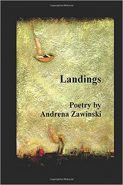
Review: Landings by Andrena Zawinski
Reviewed by Joan Gelfand

Landings
Poems by Andrena Zawinski
Kelsey Books, April 2017
$17.00, 98 pp.
ISBN 13: 978-1945752728
It’s tempting to bury our pasts. Haunted by the ghosts of family dysfunction, financial strain and personal shame, Andrena Zawinski’s Landings is a collection of unflinching poems that confront personal and political violence, global upheaval and senseless loss, all the while remaining true to close observation and creating beauty from tragedy.
In “Rosie Times,” the poet plays loose with irony, recounting her mother’s story working as a “Liberty Girl” in Northeastern factories during WWII: “Draped in white overalls, hair wrapped in a red scarf / Under a hard hat, clear goggles shielding her amber eyes / She welded Pressed Steel’s box cars outside Pittsburgh.” Despite the no-nonsense work ethic and hard living her mother endured, she retained a love of a good time. But she also neglected to protect the daughter who loved her:
belted out the high notes / of Indian Love Call at a USO picnic.
She learned to love the night shift as a blackout warden
and became the woman who I would later blast
for not pulling me free from my father’s fierce grip.
From the safe distance of adulthood, Zawinski ventures a hard look into the psyche of a father who, apparently, faced his own demon. In “What About a Fight:”
They say my father loved a fight. Was it his old juvie record
trumping determination or hope, his annulled marriage
to a bigamist collecting veteran’s checks
or layoffs at the mills
before benefits kicked in, a monotony of existence?
Not a pleasant undertaking, the poem bears witness to working class ennui, malaise and brokenness.
Landings toggles between personal and world crises. In “Le crayon qui parle” we hear a lament for Paris after the attacks. To place the attack in historical context, we first hear of Picasso’s creation of the Guernica: “An arm raised with a lamp of light.” Fast forward to the current scene:
a wounded city mourning and left to do
what it must – to witness, to sing or to pray,
to hold vigil, to take up paints or dig hands in clay
to run fingers across keys, to put pen to paper
to let le crayon parle as dreary fearsome nights
begin to fade and chains of pain break and fall
By bringing in a scene where Gertrude Stein tells Picasso to “put down the pen and go home and paint” in the first stanza, the poet engenders empathy not only for the Paris of terrorist attacks, but also the city that survived a Nazi invasion and two world wars.
“Rafts,” mourns the immigrant crisis, juxtaposing a family picnic against refugees floating across a tumultuous sea from Aleppo: “A three-year-old washes up onto the beach, face down on the sand / Limp body leaden in his father’s arms / Water lapping the wounded shore.” When humanity suffers, the earth suffers: a truth we know but can afford to hear again and again.The body may be gone but the spirit lives on. The trope repeatedly acts as a through line in Landings. Life is unforgiving. Senseless violence pervades. People are hurt, injured and die for no reason. Still, we land, an indomitable spirit and will to survive intact.
The final section, “Civics Lessons,” employs the prose poem form to relate a story about the school days that informed the poet’s adult political leanings. In two flash-sized chapters, Zawinski recounts a Civics teacher who punished her for “not putting her hand to her heart to recite the national anthem” but then proceeded to bribe her father for his vote. The aforementioned teacher was later incarcerated. Chapter two brings us a new crisis: Martin Luther King’s assassination:
Martin Luther King, Jr. had been assassinated in a Memphis motel, the cashier barking: “It’s about time someone shut that nigger up.” Outside, business owners scrawled Soul Brother across their boarded-up shops under a sky thick with smoke layered like low flung storm clouds. Police in swat gear with crackling megaphones cleared streets and blocked bridges, while “All You Need Is Love” blasted from speakers propped in an apartment house window. Like so many before and so many after, I signed on, sat in, marched, protested, carried signs believing that raising my voice would make words matter. Civics lesson.
Ever the soldier for human rights and blessed with a fighting spirit, this poet possesses a healthy dose of empathy with which she processes the stranger’s pain. Without self-pity or regret Zawinski narrates the events that shaped her into the person and writer she is today. We are grateful that so deleterious a past delivered a lover of beauty and a citizen of the world.
Joan Gelfand is the author of The Long Blue Room and You Can Be a Winning Writer: the 4 C’s of Successful Authors: Craft, Commitment, Community and Confidence from Mango Press.

It’s a beautiful, passionate book.